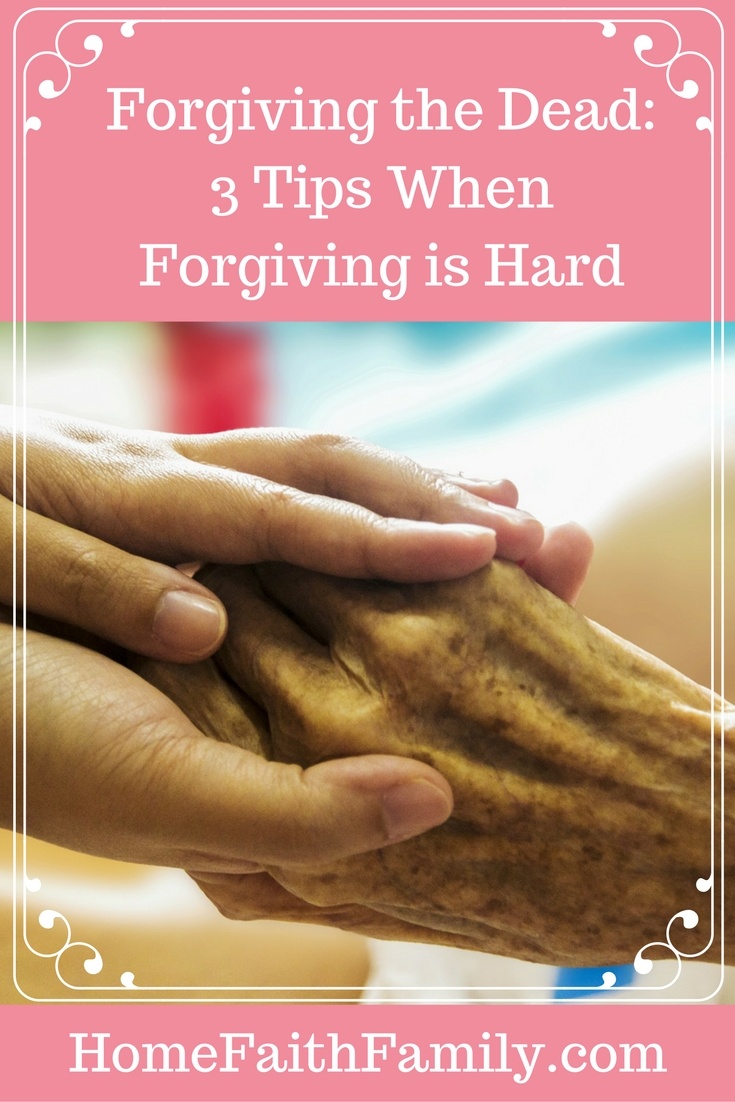We will all lose someone close to us at some point in our life. This could be a mother, father, sibling, grandparent, or a friend. Suffering a loss brings feelings of despair, grief, sadness, regret, and sometimes anger.
I once attended the funeral of a friend where the pastor made the comment, “we hurt much because we love so much.”
Another reason why you might hurt includes experiencing pain and suffering from an event in your life that was caused by the one who is now deceased. Even though this loved one is gone, it doesn’t mean hope is lost. Forgiveness can be extended and healing can still occur, even when forgiving the dead is difficult to do.
Forgiving the Dead: 3 Tips When Forgiving is Hard
1. Write a Letter
Visualize the deceased and write them a very detailed letter. If you can be specific about the date or time of the year, the event, and then your emotions. Write about how this hurtful event has caused you pain and has affected you throughout your life. Don’t hold anything back as your write and don’t censor your word choice. Write as you feel.
I will provide a word of caution. This exercise should be done to promote and allow for healing to occur, not to bring up past events so they can fester and cause more pain. Once the letter is written read it out loud to yourself.
By verbally expressing these emotions you acknowledge them and are expressing them for the first time instead of keeping them hidden. I know some family members who visualize the deceased when they do this exercise and they’ve expressed the wonderful difference it’s made for them.
If you feel a need to keep this letter for a time, then please do. Keep your letter in a safe place, tucked away. I would advise you to destroy the letter at some point in your life. The dead have no privacy and you will need to ask yourself: when your time comes, will you want someone to find this letter?
2. Talk Out Loud
Pick a time when you’re home alone and visualize yourself having a conversation with your loved one. Speak openly and freely about when they hurt you, how much pain this has caused you, and why you can’t seem to forgive them.
When an offense by someone causes us pain our grief and feelings are justified. But when we hold onto that pain and allow it to rule over our lives then it is us who loses, not the offender.
I understand that there are some offenses and sins that will require a great deal of bravery to forgive. If someone has been sexually or physically attacked, or when abuse was prevalent in the home, this is where I would also recommend professional help to guide you in your healing process.
There is no shame in reaching out for help, especially from professionals. You’ve been hurt once and you’ve been carrying this pain throughout your life. Now that your loved one has passed it’s time to heal so you don’t spend the rest of your life suffering. Because in suffering they still have power.
3. Balloons and Trinkets
I knew a woman who suffered a great loss and unresolved issues were still involved. She spent time writing her grievances down and assigning a symbol to each one. When she felt the time was right she went and bought one helium balloon per grievance and drew the symbols on the balloons. She said a prayer and let go of the balloons.
I later asked her about this act and she said that this was her way of “letting go” of her feelings and grievances with this loved one. She commented that this particular family member had power over her while they were alive, but she didn’t want to give them power while they were dead.
After you feel you have forgiven your loved one, find a small trinket. This can include a small pebble or something that won’t attract a ton of attention. You will want to place it somewhere where you’ll see often as a reminder that you can do hard things. This will also serve as a reminder for when built up anger tries to creep in that you’ve forgiven and need to keep moving forward.
In the book of Matthew we read:
“For if ye forgive men their trespasses,
your Heavenly Father will also forgive you.”
Matthew 6:14
Please don’t misunderstand this one thing:
To forgive does not mean we accept the sin. On the contrary, to forgive means we are no longer allowing that act to have power over us in our lives. We have essentially created “new feelings” towards the person and the act, but that does not mean we have to forget what they did.
Christ counsels us that “judgment is his” and his alone. If we want to be forgiven, we need to forgive. Once we forgive we need to turn our feelings, the act that has required our forgiveness, and ourselves over to the Lord.
As you do this you will create a new life for yourself, one that does not harbor anger or sadness. And please know, there is no shame in seeking professional counsel and help. Remember, you are strong, and you can do hard things.

Micah Klug is a wife, homeschooling mother to five children, and author. She teaches time-tested solutions to help parents remember what matters most in life, including strengthening their home, faith, and family relationships. To learn how a child who grew up in an authoritarian home is now creating an environment of peace and joy in her own home visit this page. If you want to contact Micah, send her an email here or email [email protected].










